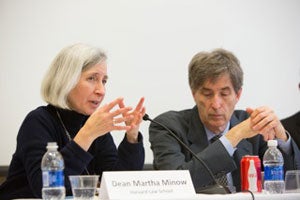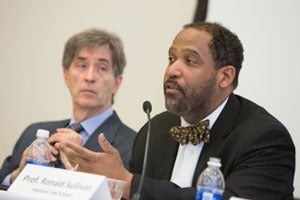On Feb. 15, a panel of legal and public-health scholars gathered at Harvard Law School for a public forum on gun violence, gun policy and the prospects for meaningful reform in a post-Newtown landscape. “Gun violence after the Newtown tragedy: What can legal, public health and other efforts do?” was moderated by HLS Dean Martha Minow, and featured David Hemenway, professor of health policy and management at the Harvard School of Public Health; Clinical Professor Ron Sullivan, director of the Harvard Criminal Justice Institute; Alan A. Stone, Touroff-Glueck Professor of Law and Psychiatry.
Hemenway, who is director of the Harvard Injury Control Research Center, described ways in which firearms can be better regulated through adoption of a public-health approach to the issue.
“The goal of public health is to create a system where it’s hard to make errors and hard to behave inappropriately, and when people still do behave inappropriately and make errors, that nobody gets hurt badly,” he explained.
He suggested that the gun industry today may be where the auto industry was 60 years ago, when automakers began receiving pressure to build safer cars. Since then, due to myriad safety improvements in cars, highway design, emergency-response improvements, and stronger drunk-driving laws, “fatalities in the United States have fallen over 90 percent per mile driven, an incredible success story,” he said. “It was done was by changing the system.”
Hemenway said gun manufacturers could do much more to make guns safer. They could use a variety of technologies to “personalize” guns so that if they are stolen they can’t be operated; manufacturers could adopt “ballistic fingerprinting” on guns so that they leave unique marks on bullets, thus aiding tracing efforts; and trigger pull tensions could be set so that young children couldn’t fire the gun.

Stone turned his attention to the role that mental-health public policy is playing in the gun-violence debate and painted a dismal picture.
In the cases of mass shootings, he pointed out, the perpetrators were already known to be troubled and to have had contact with mental-health professionals, but ongoing treatment never materialized.
“Whether you’re rich or poor, there’s no continuity of care left in the mental-health system,” he said “It just doesn’t exist.”
Second-year HLS student Robert M. Cross also took part on the panel and related some of the things he learned after working last summer at the Brady Center to Prevent Gun Violence in Washington, D.C.
He emphasized that a large part of the problem results from the limits that the gun lobby has managed to place on the regulated market. Background checks are only required on transactions that occur involving federally licensed gun dealers, he said, leaving all private sales unregulated.
“It is estimated that over 40 percent of gun acquisitions occur in the secondary market,” he said. “And it’s totally legal.”
Like Hemenway, Cross said the majority of Americans, including gun owners, support universal background checks.
“People like (NRA executive vice president) Wayne LaPierre, who you see on TV, are not representing Americans, they’re not representing the NRA, they’re not representing gun owners,” Cross said. “They’re representing the gun industry, an industry that makes money off the blood of children.”
Related news: “Tribe, panel urge culture change to target gun violence“
